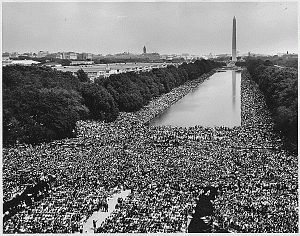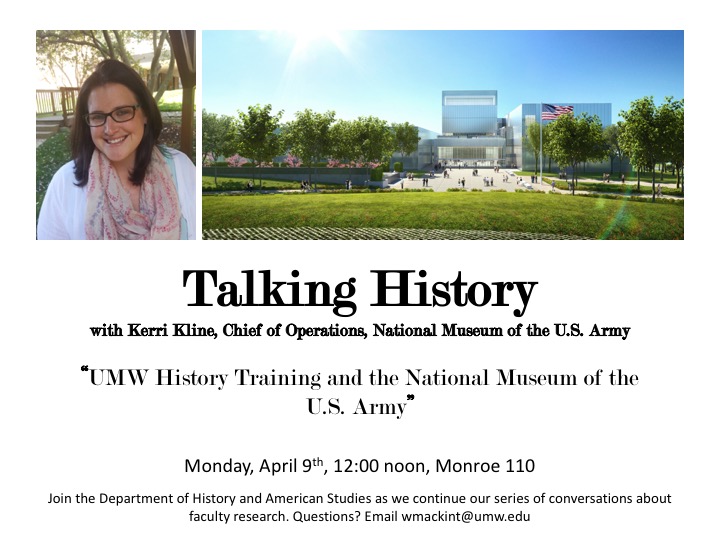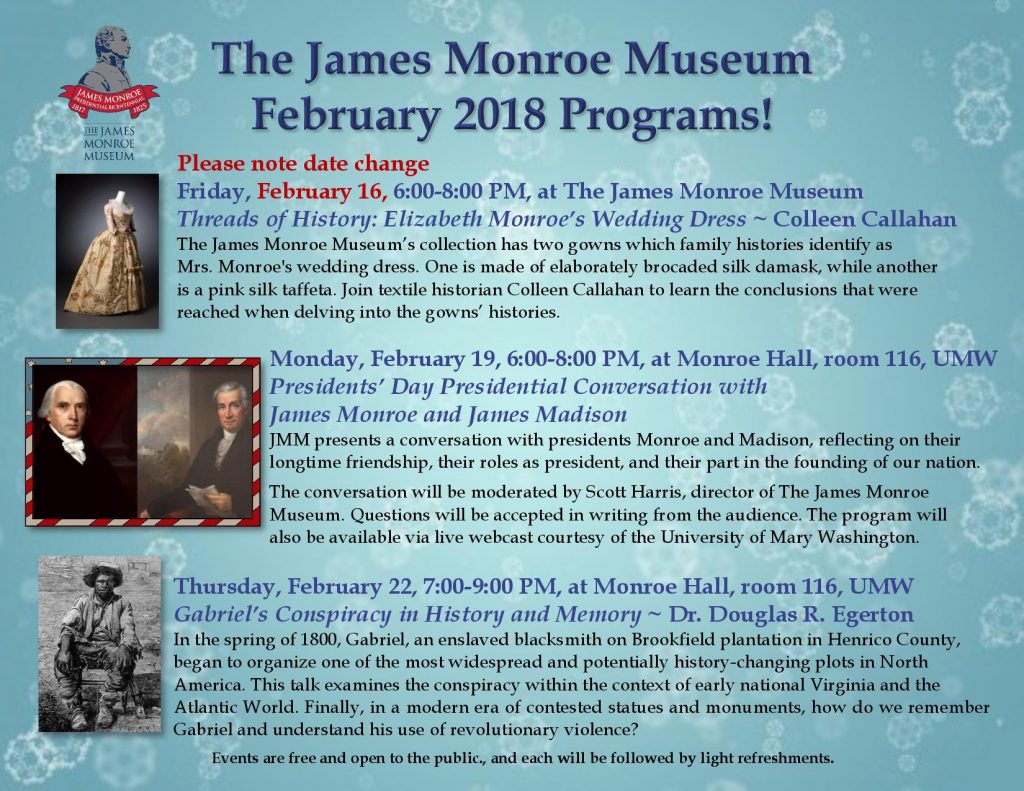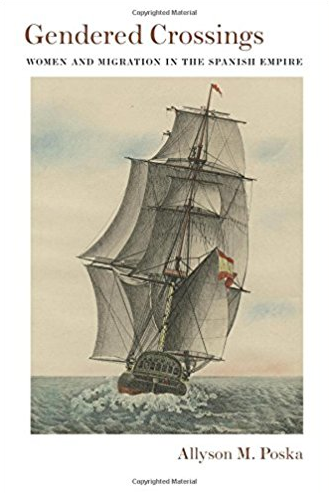Talking History (4/9): Kerri Kline, “UMW History Training and the National Museum of the U.S. Army”
Internship Workshop – 2/14

Give your future a little love!
Celebrate Valentine’s Day with a workshop on internships for History Majors
February 14
4pm / Monroe 233
For more information contact
Dr. Poska aposka@umw.edu
Welcome Back! 485 Meeting and More…
 Welcome back for the Spring 2018 Semester! We hope Winter Break was relaxing for all.
Welcome back for the Spring 2018 Semester! We hope Winter Break was relaxing for all.
485 mandatory meeting: All 485 students should come to a meeting at 5 pm on Wednesday in Monroe 210 (note: location subject to change–keep an eye on your umw email). Information about the syllabus, standards for completion–and tips for success–and more will be discussed. You’ll also have an opportunity to share questions and meet fellow thesis writers. For current syllabi, see our 485 sites for History and American Studies.
Interested in past topics UMW students have presented? See our recent symposium schedules here and here.
Also, don’t miss the excellent Internship Diary post shared by Claire Goode (2017) this past December — Claire created an online exhibit of James Monroe’s 1818 tour of the Chesapeake Bay area in work for The Papers of James Monroe documentary editing project hosted right here at the University of Mary Washington.
Image: Civil Rights March on Washington, D.C., 8/28/1963. Image from National Archives still picture records section, National Archives, College Park, MD. Via Flickr Commons – link.
Fall 2017 Symposium – Friday, 12/8
Fall 2017 Symposium
Department of History and American Studies
Friday, December 8, 2017
9 am – 2 pm, Monroe 210 and 111
All are welcome!
SESSION ONE. 9:00 AM. Monroe 210 – Selected Papers: Culture, Gender, and a New Military History
Moderator: Susan Fernsebner
Elisha Sese-Khalid – “The War Theatre of Jazz and Jim Crow”
Emily James – “Girls in 2-D with Real Significance: Paper Dolls and Girlhood in the 1940s and 1950s”
Clenda Membreno – “Guerillas: How the Salvadoran Civil War Impacted the Lives of Women”
SESSION TWO. 9:00 AM. Monroe 111 – New Looks at the Second World War
Moderator: Steve Harris
Jacob Carter – “Steel Behemoths: Evolution of Tank Combat and Design, 1919-1943”
Buffy Schilling – “Churchill and Roosevelt: Common and Conflicting Interests that Helped Win World War II”
Joshua Hunt – “Chemistry and Collaboration: The Nuremberg Trial of the IG Farben Executives”
SESSION THREE. 10 AM. Monroe 111 – Race, Gender, and Education
Moderator: Krystyn Moon
Steven Albright – “The Role of the G.I. Bill in Changing Higher Education and Society in America”
Kierra Wormley – “Beauty is in the Eye of the Beholder: Black Women, the Black Press and White Beauty Standards, 1960-1980”
Raven Sharrieff – “Shades of Femininity: Colorism in Adolescence in the 21st Century”
SESSION FOUR. 11 AM. Monroe 210 – Selected Papers: History and Media
Moderator: Bruce O’Brien
Nicole Spreeman – “The Representation of the Armenian Genocide in The New York Times in 1915”
Darron Lockett – “Perception: Understanding Thomas Edward Lawrence and His Effect on Historical Literature”
Samuel Goad – “Bandits, Billionaires, and Bombers: A Historical Analysis of Western Film Depictions of the Middle East”
SESSION FIVE. 11 AM. Monroe 111 – Creating and Destroying Group & National Identities in American History
Moderator: Erin Devlin
Kasey Mayer – “The Cherokee and Their Reactions to the Dawes Act of 1887”
Christopher Noebels – “The Boy Scouts of America and Wilderness”
12:00 pm – 1:00 pm Lunch Break
SESSION SIX. 1 PM. Monroe 210 – Spouses, Asylums, and the Stage: Papers in US History and American Studies
Moderator: Will Mackintosh
Claire Gunnell Goode – “The Husbands of the Women’s Movement: James Mott, Theodore Weld, and Henry Stanton”
Anna Brooks – “The Women of the Western State Lunatic Asylum”
Lindsey McCuiston – “For America: The Story of Hamilton and its Message to the World”
SESSION SEVEN. 1 PM. Monroe 111 – Topics in Global History
Moderator: Nabil Al-Tikriti
Kyle Powers – “Napoleon: Revolutionary or Betrayer to a Nation?”
Curtis Smedley – “The Middle Path”
John Guidon – “The Sakartvelian Charade: An Investigation Into the Use of Media as Russian Soft Power and the Involvement of Organization Crime Syndicates in the Coup of Zviad Gamsakhurdia”
SESSION EIGHT. 2 PM. Monroe 210 – Rivers and Bays: Environmental History in the Chesapeake Watershed
Moderator: Allyson Poska
Woodie Walker – “Land of Transition: A Bioregional Discussion of the Fall Line of the Rappahannock River, From Pre-contact through the Early Colonial Era”
Neil Sargent – “The Battle of the Bay: Humankind versus the Chesapeake”

 Dr. Will Mackintosh has been named to the inaugural class of scholars at the Bright Institute of Knox College. He will join fourteen liberal arts professors in receiving a $9,000 award of research support over three years. This honor will support his research on the Loomis Gang.
Dr. Will Mackintosh has been named to the inaugural class of scholars at the Bright Institute of Knox College. He will join fourteen liberal arts professors in receiving a $9,000 award of research support over three years. This honor will support his research on the Loomis Gang.

